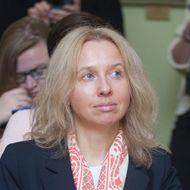- A
- A
- A
- ABC
- ABC
- ABC
- А
- А
- А
- А
- А
- HSE University
- Faculties
- Faculty of Humanities
- School of History
- Events
- The Purging of the leadership of NKZem and TsSU in 1937 and 1938: a talk by prof. Stephen G. Wheatcroft
105066 Moscow, Staraya Basmannaya 21/4, building 3
Phone: +7 (495) 772 95 90 *22858
The HSE School of History was established in 2015 on the basis of the HSE faculty of history. The School's staff brings together leading scientists in various fields of historical knowledge who are widely known and respected in Russia and the international academic community. The School’s instructors are leading historians are authors of numerous books and articles, regular participants in major international scientific forums and research projects, and are also known as popularizers of historical knowledge. The HSE School of History actively cooperates with leading foreign universities and research centers, and organizes international scientific conferences, symposia, and colloquiums.
Strasbourg: Presses universitaires de Strasbourg, 2023.
Misiak M., Butovskaya M., Sorokowski P.
Food Quality and Preference. 2024. Vol. 114.
In bk.: Picturing Russian Empire. Oxford: Oxford University Press, 2024. Ch. 6. P. 66-73.
Kolesnik A., Rusanov A.
Working Papers of Humanities. WP. Издательский дом НИУ ВШЭ, 2021. No. 205.

The Purging of the leadership of NKZem and TsSU in 1937 and 1938: a talk by prof. Stephen G. Wheatcroft
Abstract. This paper arises out of the work that I am currently concluding on the final volume (7) of the RWDavies series The Industrialization of the USSR: The Years of Terror and Preparation for War. The work on that volume is being carried out by R.W. Davies, Mark Harrison, Oleg Khlevnyuk and myself. I am responsible for the sections on agriculture and demography in the volume, and hence my interest in this topic.
How did the purges of the leadership groups in TsSU and NKZem proceed? What explains the differences and their timing? Both can be seen to have specific local reasons, but they were also part of a general chaotic process of the time. Although it would be wrong to try to identify a simple rationale for this complex event, the study of how the purge of the leadership unfolded in different organizations, may tell us something about the nature of this process, as well as its impact in those organizations.
Stephen G. Wheatcroft is a Professorial Fellow in the School of Historical and Philosophical Studies in the University of Melbourne in Australia. He has worked mainly on Soviet Economic, Demographic History, and the history of famine, but has also looked at some aspects of political history. See http://www.melgrosh.unimelb.edu.au/ecohistory_papers.php, http://www.melgrosh.unimelb.edu.au/demography.php, http://www.melgrosh.unimelb.edu.au/repression/home.php http://www.melgrosh.unimelb.edu.au/php/pol_home.php http://www.melgrosh.unimelb.edu.au/famine.php
The seminar will be held at Staraya Basmannaya str. 21/4, buildig L, room L-405. The language of the event is English.
Guests needing an access into the HSE biulding are kindly asked to get in touch with School of History manager Nadezhda Nekrasova via email nvnekrasova@hse.ru.
- About
- About
- Key Figures & Facts
- Faculties & Departments
- International Partnerships
- Faculty & Staff
- HSE Buildings
- Public Enquiries
- Studies
- Admissions
- Programme Catalogue
- Undergraduate
- Graduate
- Exchange Programmes
- Summer University
- Summer Schools
- Semester in Moscow
- Business Internship
-
https://elearning.hse.ru/en/mooc/
Massive Open Online Courses
-
https://www.hse.ru/en/visual/
HSE Site for the Visually Impaired
-
http://5top100.com/
Russian Academic Excellence Project 5-100
- © HSE University 1993–2024 Contacts Copyright Privacy Policy Site Map
- Edit



